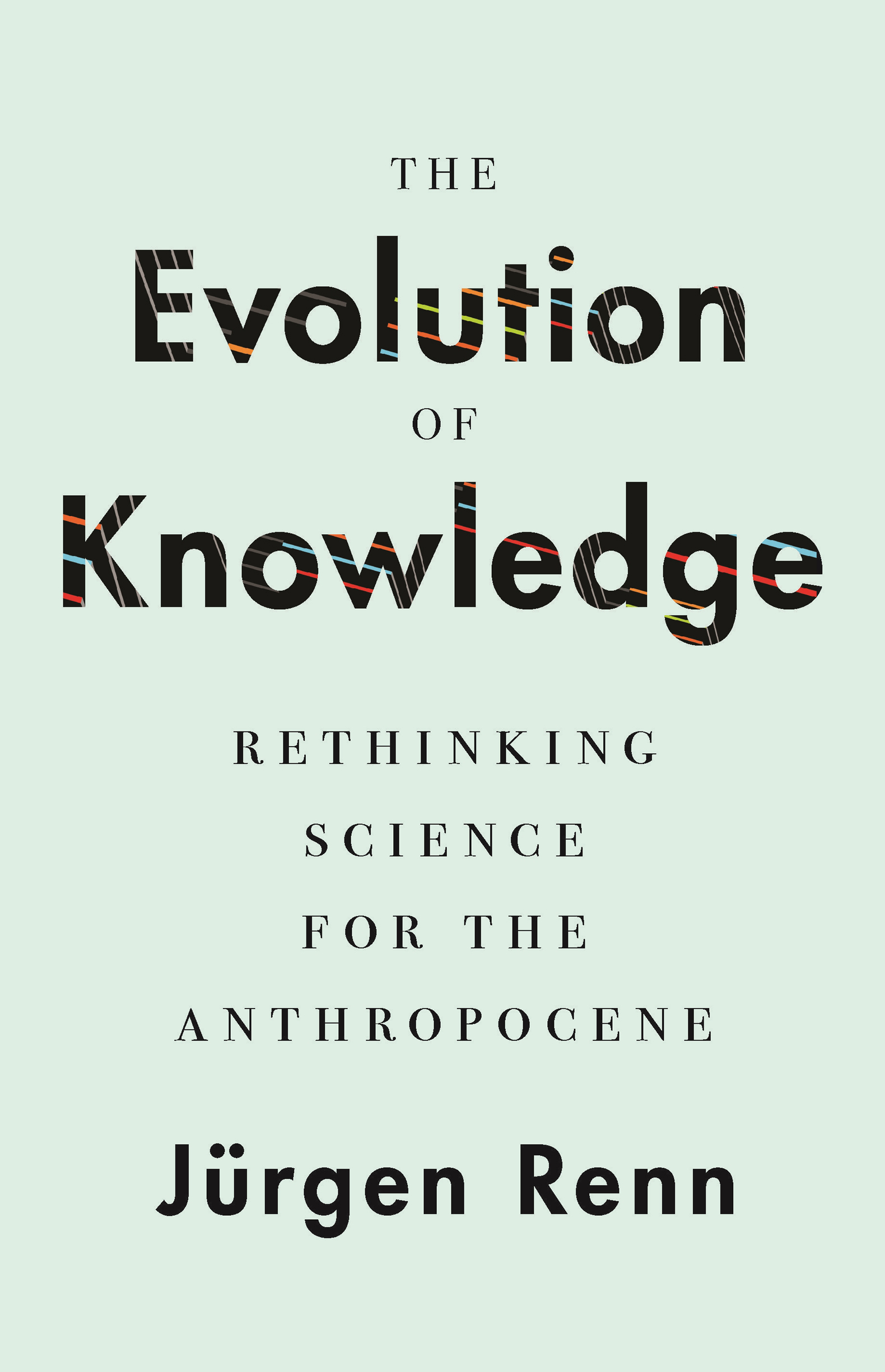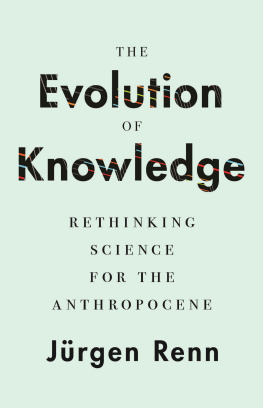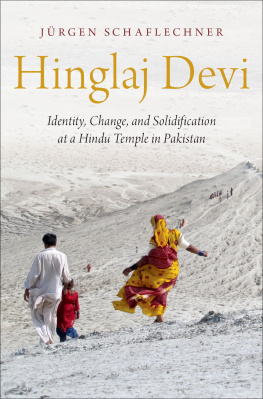Jürgen Renn - The Evolution of Knowledge
Here you can read online Jürgen Renn - The Evolution of Knowledge full text of the book (entire story) in english for free. Download pdf and epub, get meaning, cover and reviews about this ebook. year: 2019, publisher: Princeton University Press, genre: Science. Description of the work, (preface) as well as reviews are available. Best literature library LitArk.com created for fans of good reading and offers a wide selection of genres:
Romance novel
Science fiction
Adventure
Detective
Science
History
Home and family
Prose
Art
Politics
Computer
Non-fiction
Religion
Business
Children
Humor
Choose a favorite category and find really read worthwhile books. Enjoy immersion in the world of imagination, feel the emotions of the characters or learn something new for yourself, make an fascinating discovery.

- Book:The Evolution of Knowledge
- Author:
- Publisher:Princeton University Press
- Genre:
- Year:2019
- Rating:3 / 5
- Favourites:Add to favourites
- Your mark:
- 60
- 1
- 2
- 3
- 4
- 5
The Evolution of Knowledge: summary, description and annotation
We offer to read an annotation, description, summary or preface (depends on what the author of the book "The Evolution of Knowledge" wrote himself). If you haven't found the necessary information about the book — write in the comments, we will try to find it.
The Evolution of Knowledge — read online for free the complete book (whole text) full work
Below is the text of the book, divided by pages. System saving the place of the last page read, allows you to conveniently read the book "The Evolution of Knowledge" online for free, without having to search again every time where you left off. Put a bookmark, and you can go to the page where you finished reading at any time.
Font size:
Interval:
Bookmark:

THE Evolution OF Knowledge
THE Evolution OF Knowledge
RETHINKING SCIENCE FOR THE ANTHROPOCENE
Jrgen Renn
PRINCETON UNIVERSITY PRESS
Princeton & Oxford
Copyright 2020 by Princeton University Press
Requests for permission to reproduce material from this work should be sent to
Published by Princeton University Press
41 William Street, Princeton, New Jersey 08540
6 Oxford Street, Woodstock, Oxfordshire OX20 1TR
press.princeton.edu
All Rights Reserved
Library of Congress Cataloging-in-Publication Data
Names: Renn, Jrgen, 1956 author.
Title: The evolution of knowledge : rethinking science for the Anthropocene / Jrgen Renn.
Description: Princeton : Princeton University Press, [2020] | Includes bibliographical references and index.
Identifiers: LCCN 2019016246 | ISBN 9780691171982 (hardcover)
Subjects: LCSH: SciencePhilosophy. | ScienceHistory.
Classification: LCC Q175 .R39275 2020 | DDC 500dc23 LC record available at https://lccn.loc.gov/2019016246
ISBN (ebook): 9780691185675
Version 1.0
British Library Cataloging-in-Publication Data is available
Editorial: Eric Crahan, Thalia Leaf
Production Editorial: Terri OPrey
Text Design: Pamela L. Schnitter
Jacket/Cover Design: Pamela L. Schnitter
Production: Jacqueline Poirier
Publicity: Sara Henning-Stout, Katie Lewis
Copyeditors: Zachary Gresham, Beth Gianfagna
For Kathrin and Erika, Leonardo, Eleonora, and Louis
- viii
- ix
I can see no other escape from this dilemma (lest our true aim be lost for ever) than that some of us should venture to embark on a synthesis of facts and theories, albeit with second-hand and incomplete knowledge of some of themand at the risk of making fools of ourselves.
ERWIN SCHRDINGER, What Is Life?
This book covers a time span from the origins of human thinking to the modern challenges of the Anthropocene. The Anthropocene is regarded here as the new geological epoch of humankind, defined by the profound and lasting impact of human activities on the Earth system. The Anthropocene is thus the ultimate context for a history of knowledge and the natural vanishing point for an investigation of cultural evolution from a global . From this perspective, I have tried to bind multiple historical and geographical horizons together. This book deals with both the longue dure aspects of the evolution of knowledge and the accelerated changes in the development of knowledge that have brought us into the Anthropocene.
The foundation of the book is research pursued at the Max Planck Institute for the History of Science since 1994. My studies and those of my colleagues have been dedicated from the beginning to an investigation of the history of science as part of a larger history of human knowledge. We have consistently emphasized the role of practical knowledge and historical continuity, even when focusing on the turning points of modern science. Our investigations include cross-cultural comparisons, in particular between Western, Chinese, and Islamic science, and a research program on the globalization of knowledge in history.
The research on which this book is based has been (and continues to be) a joint endeavor. It was born from a conceptual framework for a historical epistemologyunderstood as a historical theory of knowledgedeveloped with Peter Damerow, Peter McLaughlin, and Gideon Freudenthal on the basis of earlier work by Peter Damerow and Wolfgang Lefvre on science and its relation to human labor and its societal organization. Wolfgang Lefvre, Klaus Heinrich, and Yehuda Elkana taught me to see science within the broadest contexts of human history and to critically rethink the promises of its Enlightenment ideals and its potential to contribute to humanitys self-awareness.
The present work owes much to the thinking of Peter Damerow, to his leading role in our research team, and to our friendship and collaboration over more than thirty years. It also builds on the fundamental theoretical insights (drawing from philosophy, educational research, psychology, and cognitive science) collected in his 1996 book, I have incorporated here some of the materials we prepared for a joint book on the history of mechanicsa book that could not be completed owing to his premature death in 2011.
Our research at the Max Planck Institute for the History of Science is pursued along two main axes: the long-term and globalization. Both of these aspects are essential, I believe, for understanding how we came to enter the Anthropocene, and both reveal patterns in the evolution of knowledge that have long been underestimateddespite their relevance in coping with challenges of the Anthropocene. As such, both are reflected in the structure of this book.
The history of science and technology has traditionally privileged innovation over the transmission, transformation, and transfer of knowledge. But it was often the less spectacular knowledge that led to the most celebrated discoveries and inventions. Some of this knowledge exhibits a striking stability and durability, often persisting over long stretches of time through phases of fundamental change. Similarly, the intercultural transfer and transformation of knowledge have shaped technological and scientific achievements since the dawn of human culturea circumstance that is easily overlooked when focusing exclusively on the apparent points of convergence.
On the basis of our historical investigations, we have attempted to build up a theoretical language that helps us to describe all of these developmental and transmission processes, regardless of type or medium. For this purpose, we have drawn on insights from historical disciplines such as archaeology, political and economic history, the history of science and technology, and the history of art and religion, as well as from philosophical epistemology, cognitive science, the social and behavioral sciences, and in particular from sociology, economics, psychology, and social anthropology.
How can one possibly tackle such an ambitious and comprehensive research programand how to present its outcome? Back in 1994, we decided to try an approach that may be likened to the attempt of biologists to understand general biological patterns by focusing on a single model organism such as Drosophila melanogaster or to the strategy of a film producer adapting a complex novel, with many interwoven narrative strands, into a simplified script for a movie: reduce the number of characters and narrative levels and concentrate on a few, carefully selected key figures and themes. In our context, of course, it was not a question of selecting dramatis personae but rather of concentrating on a certain strand and domain of knowledge development that seemed particularly suited to investigations of both the long-term developments and the global transformations of knowledge.
One narrative strand on which we have concentrated our efforts is the history of mechanics in its widest sense. What I mean is not so much the history of mechanics as a specific scientific discipline, but the history of mechanical knowledge, ranging from elementary, intuitive knowledge about a world in which gravity and pressure reign, to practical knowledge emerging from experience with instruments and tools, to theoretical forms of knowledge as documented in written texts. Mechanical knowledge has a history extending from its prehuman originsvia a long tradition of practical experience, natural philosophy, and classical mechanicsto the latest developments of science, including the new mechanics of relativity theory and quantum mechanics. Another remarkable and relevant feature of mechanical knowledge is the fact that it is not the exclusive boast of the Western tradition but has flourished in other cultures across time.
Font size:
Interval:
Bookmark:
Similar books «The Evolution of Knowledge»
Look at similar books to The Evolution of Knowledge. We have selected literature similar in name and meaning in the hope of providing readers with more options to find new, interesting, not yet read works.
Discussion, reviews of the book The Evolution of Knowledge and just readers' own opinions. Leave your comments, write what you think about the work, its meaning or the main characters. Specify what exactly you liked and what you didn't like, and why you think so.





